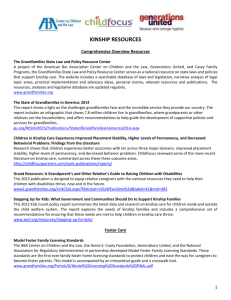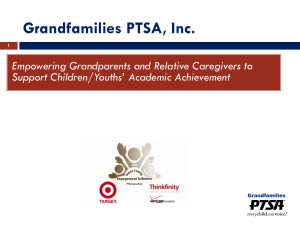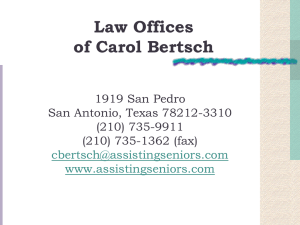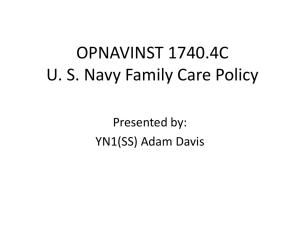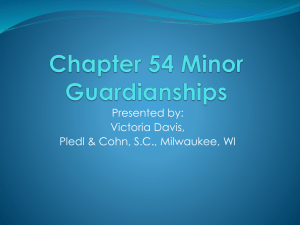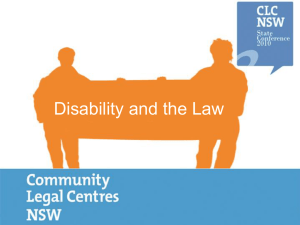Kinship Placements Legal Issues
advertisement
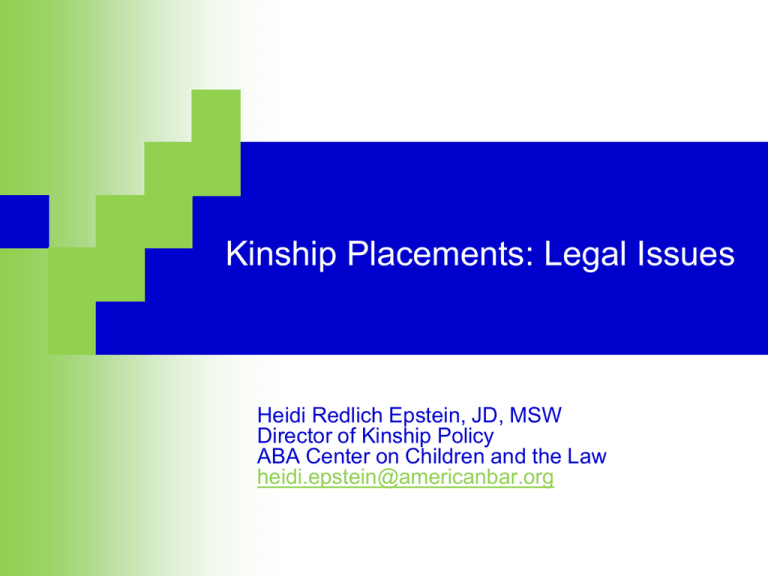
Kinship Placements: Legal Issues Heidi Redlich Epstein, JD, MSW Director of Kinship Policy ABA Center on Children and the Law heidi.epstein@americanbar.org The Legal Status of the Caregiver-Child Relationship © 2013 www.grandfamilies.org 2 Various Forms of Care and Custody Continuum of legal relationships between caregiver and child: Relative “Formal” Foster Care Informal care Legal Custody and Guardianship Subsidized Guardianship Power of Attorney Adoption 3 © 2013 www.grandfamilies.org Relative “Formal” Foster Care In the US, one in four children are formally placed with relatives in the foster care system In Wyoming, approximately 20% of children in outof-home care were living with relatives (2010) Federal law requires states consider giving preference to a relative when placing a child. Each state has its own eligibility and licensing criteria for placing a child with a relative, see www.grandfamilies.org Relatives licensed as a foster parent for a child who is title IV-E eligible must receive the same foster care payment as a non-kin foster parent. © 2013 www.grandfamilies.org 4 Informal Caregivers Many relatives raising children do so “informally” - without a legal relationship Often “diverted” from the formal child welfare system Legal process can be emotionally exhausting and damaging to relationships It’s hard to find & afford lawyers Caregivers often hope child will ultimately return to parents’ care Without a legal relationship, families often face more barriers In Wyoming: 7.6% children under age 18 live in homes with grandparents or other relatives as primary caregivers (U.S. 2010 Census) © 2013 www.grandfamilies.org 5 What is Kinship Diversion? Child welfare agency investigates a report of child abuse and neglect Determines a child cannot remain safely with parent/guardians Helps to facilitate child’s ongoing care with relative instead of bringing a child into state custody Nationally, 400,000 children referred to the child welfare system are diverted form state custody to live with kin © 2013 www.grandfamilies.org 6 Kinship Diversion: Arguments FOR Whenever possible, kinship diversion is preferable option for children and families With the right supports, families are better able to care for children without the complications and uncertainty of government involvement © 2013 www.grandfamilies.org 7 Kinship Diversion: Arguments AGAINST Relatives are being unfairly pressured into caring for children without understanding their options or receiving appropriate services and financial support Without the protections of foster care, birth parents are not being given a fair chance at reunification © 2013 www.grandfamilies.org 8 Legal Custody and Guardianship Legal Custody and Guardianship - legal responsibility to make decisions, provide care, and access services for a child is transferred from parent to another caregiver. Legal Custody – typically refers to family/juvenile court WY: District Court Guardianship – typically refers to probate courts and codes (except subsidized guardianship) WY: District of Juvenile Court Court does not terminate parental rights or responsibilities Parents preference and best interest of the child prevail Parents can go back to court and ask that guardianship or legal custody be terminated. Allows caregiver to make decisions for the child and access services. 9 © 2013 www.grandfamilies.org Subtypes of Legal Custody & Guardianship Emergency guardianship – judge appoints petitioner, if adherence to procedural requirements for guardianship hearings would likely result in substantial harm to the child without a guardian (Wyo. Stat. Ann § 3-2-106) Standby guardianship – pre-appointed future guardian steps in after triggering event occurs. (§ 3-2-108) Temporary guardianship – powers of guardian limited to those set forth in order of appointment. WY: limited to 1 yr. (WY § 3-2-106).) De facto custody - child’s primary caregiver for some period of time in the parents’ absence granted custody (not available in WY) Guardianship by Probate – clause in will names guardian upon death of parent and court approval/appointment. 10 © 2013 www.grandfamilies.org Standby Guardianship Allows terminally ill parent to designate standby guardian to care for child when parent becomes incapacitated or dies Triggering event (illness, death)must occur first Began after AIDS epidemic More than half of the states have these laws: AR, CA, CO, CT, DE, FL, GA, IL, IA, KS, MD, MI, MN, MO, NE, NJ, NY, NC, OH, PA, TN, TX, VA, WA, WV, WI and WY. 11 © 2013 www.grandfamilies.org De Facto Custody "De facto custodian" defined as primary caregiver and financial support of a child who has resided with that person for at least: 6 months if the child is under age 3; and 1 year if the child is at least age 3 Some states do not define it specifically, but use it to mean someone who is basically acting as the parent After the court makes finding, caregiver usually granted legal custody and has same legal standing as parent Legal custody based on best interests of the child Wyoming does not currently have this type About 11 states have these laws – CA, DC, HI, ID, IN, KS, KY, LA, ME, MN, MT, SC. © 2013 www.grandfamilies.org 12 Subsidized Guardianship Financial support for a child exiting foster care to a permanent home with relative, no TPR required Prior to the Fostering Connections Act, 38 states had programs WY: state funded DFS program if the legal guardian’s financial concerns are the only barrier to processing a legal guardianship Since Fostering Connections, 33 jurisdictions have federally funded programs 31 states and 2 tribes have submitted plans to HHS and have been approved: AL, AK, AR, CA, CO, CT, DC, HI, ID, IL, IN, LA, ME, MD, MA, MI, MO, MT, NE, NJ, NY, OK, OR, PA, RI, SD, TN, TX, VT, WA and WI and Port Gamble S’Klallam and the Confederated Salish Kootenai Tribes. 1 state is awaiting HHS approval: WV © 2013 www.grandfamilies.org 13 Power of Attorney Documents that generally confer all powers over the care of a child, with the notable exceptions of the powers to consent to marriage or adoption Some states specifically allow caregivers to use power of attorney to confer school-related and medical decision-making Generally last six months to a year, so it may not be the best option for long term caregivers Can easily be revoked by parents Typically a power of attorney does not survive parents death (durable power of attorney) Parents complete form or document that states what type of authority they are conferring 14 © 2013 www.grandfamilies.org Power of Attorney Most states have some form of POA law. Approximately 22 are specifically written for minors – AL, AK, AZ, CO, HI, ID, IN, KY, ME, MI, MN, MO, MT, NE, NJ, NM, NY, ND, OH, OR, TN, and UT. Most other states have general POA laws. WA has specifically codified POA laws so parents can give relatives power for health care only (not the education) of their children WY – no specific power of attorney for minors 15 © 2013 www.grandfamilies.org Adoption Birth parent must either be proven unfit and parental rights terminated by the court or voluntarily surrender rights before relative can adopt. Birth parent loses all rights and responsibilities, including right to visit, pay child support and right to later claim custody of the child. Some relatives do not feel adoption is right for them; as they do not want to change the nature of their relationship with the child or parent. All states provide adoption assistance for children adopted from the child welfare system. Open adoption laws exist in some states to allow postadoption contact between birth parents & child or siblings & child. 30 states have open adoption laws: AR, AZ, CA, CT, DC, FL, IL, IN, LA, MA, MD, ME, MN, MT, ND, NE, NH, NM, NV, NY, OH, OK, OR, PA, RI, SD, TN, VA, WA, WV. © 2013 www.grandfamilies.org 16 Wyoming Care and Custody Laws Guardianship Laws - Wyo. Stat. Ann § 3-1-101 through § 3-2-303 Most guardianships heard in district court or juvenile court, if continuing jurisdiction necessary Guardian required to submit a report to the court within 6 months of the appointment and then every 6 months thereafter - § 3-2-109 Temporary or emergency guardianship - § 3-2-106 Standby guardianship - § 3-2-108 Power of Attorney - § 3-5-101 Temporary guardian for education and medical care - § 3-2-302 © 2013 www.grandfamilies.org 17 Access to Health Care and Education © 2013 www.grandfamilies.org 18 Consent Laws State-level “consent laws” allow a caregiver without legal custody or guardianship to access school enrollment for the children, school services, medical care, dental care, mental health and/or developmental treatment services for children. The laws differ in various ways, including: types of treatment whether there must be a written document to give consent authority or whether consent can be oral whether the parent(s) must sign Some of these laws allow an informal caregiver to complete an affidavit stating that he or she is the primary caregiver for the child and the child lives with him or her. 19 © 2013 www.grandfamilies.org Combined Educational and Medical Consent Laws At least six states have combined educational and medical consent laws: California, Louisiana, Massachusetts, New Mexico, and Ohio California was the first in 1994 and, like these others, has the form for the affidavit in the law itself. Cal Fam. Code 6552 For cites to the other laws, see www.grandfamilies.org © 2013 www.grandfamilies.org 20 Medical Consent More than half the states have some form of medical consent law – AZ, AR, CA (includes consent for mental health treatment), CO (immunization consent only), DE, DC (includes consent for developmental screening and mental health examination or treatment), FL, GA, HI, ID, IN, KS (immunization consent only), LA, MD, MA, MS, MO, MT, NV (emergency care consent only), NM, NY, NC, ND, OH (includes consent for psychological treatment), OK, SC, SD, TX (includes consent for psychological treatment), UT, VA, and WA (includes consent for mental health care) Cites to all these laws can also be found at www.grandfamilies.org 21 © 2013 www.grandfamilies.org Educational Consent & Other Ways to Access School Enrollment About 14 states have educational consent laws: CA, CT, DE, HI, LA, MD, MT, NJ, NM, NY, NC, OH, OK, and SC. In 5 states – MI, MO, RI, SD, and VA -- where a child lives (rather than where the parent lives) is the child’s legal residency for purposes of attending public school tuition-free . In IN, the “legal settlement” of a student being supported, cared for and living with another person is the school attendance of that person. TX has an innovative provision in its law: A child may attend a school district in which he or she does not reside, but in which the grandparent resides “and provides a substantial amount of after-school care for the person as determined by the board.” Tex. [Ed.] Code Ann. Section 25.001. 22 © 2013 www.grandfamilies.org Kinship Resources Grandfamilies State Law and Policy Resource Center Generations United www.nrcpfc.org ABA Legal Center for Foster Care and Education www.grandfactsheets.org The National Resource Center for Permanency and Family Connections (NRCPFC) www.gu.org AARP GrandFacts www.grandfamilies.org http://www.americanbar.org/groups/child_law/what_we_do/projects/ed ucation.html Bridging Refugee Youth and Children’s Services (BRYCS), Guardianship Toolkit www.brycs.org/publications/guardianship-toolkit.cfm © 2013 www.grandfamilies.org 23
